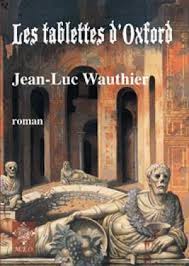Les tablettes d’Oxford by Jean-Luc Wauthier
Brussels. Éditions M.E.O. 2014. ISBN 9782930702773
 Twenty years ago, church historian Martin Marty and his accomplice Jerald C. Brauer, the late dean of the University of Chicago’s Divinity School, wrote a monograph about fictitious theologian Franz Bibfeldt. Entitled The Unrelieved Paradox: Studies in the Theology of Franz Bibfeldt and based on real and fictitious sources, this magnificent hoax was at once comic relief and escapist cover-up; it allowed its authors to probe issues vexing postmodern theologians, to reflect on the illusory nature of truth, and to safely promote their own beliefs.
Twenty years ago, church historian Martin Marty and his accomplice Jerald C. Brauer, the late dean of the University of Chicago’s Divinity School, wrote a monograph about fictitious theologian Franz Bibfeldt. Entitled The Unrelieved Paradox: Studies in the Theology of Franz Bibfeldt and based on real and fictitious sources, this magnificent hoax was at once comic relief and escapist cover-up; it allowed its authors to probe issues vexing postmodern theologians, to reflect on the illusory nature of truth, and to safely promote their own beliefs.
Les tablettes d’Oxford is built on similar premises. In the preface, Jean-Luc Wauthier recounts his discovery in the Oxford University Library in England of late antiquity tablets purportedly written by the last emperor of the western part of the Roman Empire, Romulus Augustulus. He silences his own doubts by citing Marguerite Yourcenar’s discovery of the “authentic” memoirs of Roman emperor Hadrian, introducing us through this transparent lie to the novel’s picaresque realm. An old man when he wrote his memoirs, Romulus Augustulus borrows Yourcenar’s measured and melancholy classical accents, and yet the very fabric of this literary vanitas throws us back to the present.
In an homage to the famed comic books Tintin and Asterix, Wauthier repeatedly refers to the incompetent fifth-century emperor Olybrius, whose name has become a familiar moniker for blustering characters, as in Captain Haddock’s favorite expletive, “olibrius!”; repeatedly, he echoes the intrepid loyalty of Celtic hero Asterix, forebear of Europe. Even the box containing the imperial documents (tablets and ostraca) is “sealed” by the virgin tome of a fictitious History of the Celts—an obvious tribute to nineteenth-century scholar Amédée Thierry’s Histoire des Gaulois. Thus, Les tablettes d’Oxford has a deep historical and literary resonance and a proud message.
Teetering between historical truth and fiction, the action takes place during the final years of the western Roman Empire, between 475 and 542 c.e. It witnesses the imagined rivalry of Romulus Augustulus, deposed ruler of the West, and his cousin Justinian, rising emperor of the East who became heir to Rome. This momentous and murderous time is appropriately rendered in stylistic counterpoints between the vibrant and poetic tone of youth and the reflective, noble musings of old age on one hand and the almost colloquial, more direct language used to describe historical and political events on the other. Mildness alternates with brutality, happiness with tragedy, darkness with light, dreams with reality, poetry with ribaldry, present with past, Romulus’s formal journaling with his companion Amelia’s informal ostraca, nobility with the plebe, peace with war. This rapid pace of the narrative, these unexpected plot twists and tone changes, draw the reader in. More importantly, they serve as a setting for Wauthier’s own message—namely, Romulus’s plan of founding a new western Christian civilization with the help of the Celts and the Huns, these “noble Barbarians.”
Editor of the Journal des Poètes and longtime member of the Maison Internationale de Poésie Arthur Haulot in Brussels, Wauthier has written monographs, essays, short stories, and fifteen poetic volumes. His poems have been translated into Arabic, English, Croatian, and Romanian and have earned him international literary prizes. Les tablettes d’Oxford is his second novel. Indeed, the enigmatic life of Romulus Augustulus has attracted attention: Friedrich Dürrenmatt’s 1950 play, Romulus the Great; a 2007 movie, The Last Legion; and the Marvel Comics character known as Tyrannus. Wauthier chose to keep Romulus alive long past the traditional life span attributed to him by historians. Both spoof and roman à clef, his novel is a dazzling tour de force.
Alice-Catherine Carls
University of Tennessee at Martin































